Taiwan’s housing market - overvalued, but rising
Taiwan’s property market is gaining momentum. Gradually, house prices are beginning to rise, following the past four lackluster years. Demand is increasing and residential construction activity is rising.
Taiwan’s Lutheran home price index increased 2.11% (1.54% inflation-adjusted) during the year to Q1 2019, the biggest y-o-y rise since Q4 2014, according to Sinyi Real Estate Planning and Research. Quarter-on-quarter, nationwide house prices rose by 0.74% (0.5% inflation-adjusted) in Q1 2019.
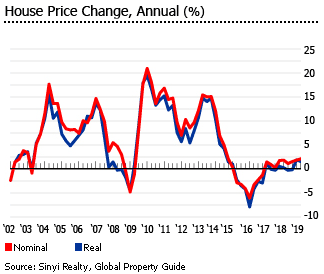
All the country’s major cities saw house price rises during the year to Q1 2019.
- In Taipei, the capital, house prices rose by 1.5% (0.93% inflation-adjusted) during the year to Q1 2019, up from the previous year’s 0.68% y-o-y increase.
- In Xinbei, house prices rose by 1.33% (0.76% inflation-adjusted) y-o-y in Q1 2019, its sixth straight quarter of annual growth.
- In Taoyuan, house prices rose by 3.47% (2.9% inflation-adjusted), its ninth consecutive quarter of y-o-y growth and the second biggest expansion since Q2 2014.
- In Hsinchu, house prices rose by 2.3% (1.73% inflation-adjusted), following y-o-y rises of 8.44% in Q4 2018, 4.61% in Q3, 2.18% in Q2 and 4.19% in Q1.
- In Taichung, house prices rose by 5.23% (4.64% inflation-adjusted), an improvement from the 3.77% growth recorded in Q1 2018.
- In Kaohsiung, house prices increased 5.42% (4.83% inflation-adjusted), the biggest expansion since Q2 2015.
In the first five months of 2019, the number of housing transactions in Taiwan’s six major metropolitan cities rose by 7.6% y-o-y to 91,095 units. Over the same period, the number of residential construction licenses issued surged 23.3% to 58,936 from a year earlier.
The housing market is expected to strengthen during the remainder of the year, buoyed by the continued interest from property investors and homebuyers, according to local property experts.
Yet Taiwan’s slowing economic growth might adversely impact the housing market. The economy grew by 1.71% in Q1 2019 from a year earlier, down slightly from 1.8% growth in Q4 2018 and the lowest expansion since hitting 1.22% in Q2 2016, according to the Directorate General of Budget, Accounting and Statistics (DGBAS). Recently, DGBAS cut its forecast for Taiwan’s 2019 economic growth to 2.19% from an earlier projection of a 2.27% growth, amidst rising uncertainty over global demand.
Demand rising strongly
Buoyed by ultra-low interest rates in May 2019, property transactions in Taiwan’s six major metropolitan cities rose by 7.8% to about 22,000 units from a year earlier, following a 28.1% y-o-y growth in April.
By city:
- In Taipei, the capital city, property sales rose by 4.3% y-o-y to 2,743 units in May 2019. Buying interest is strong in Neihu, Zhongshan and Danan.
- In New Taipei, the most populous city in Taiwan, property transactions rose by 3.3% y-o-y to 5,598 units in May 2019. The sales growth was mainly driven by the strong interest in existing homes in Zhonghe, Xindian and Tamsui districts and the new residential project in Zhonghe.
- In Taoyuan, property transactions increased 8.8% y-o-y to 3,667 units over the same period.
- In Taichung, transactions rose by 13% y-o-y to 4,141 units.
- In Tainan, transactions rose slightly by 1.2% y-o-y to 2,216 units.
- In Kaohsiung, transactions rose by 15.7% y-o-y to 3,626 units.
In the first five months of 2019, property transactions totaled 91,095 units, up 7.6% from the same period last year, with Kaohsiung sales rising by 21.7% - the highest growth among the six major cities.
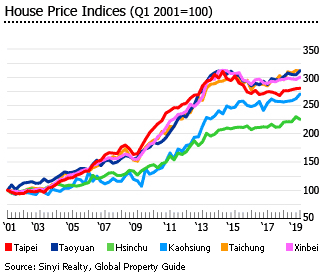
Demand started to recover in 2017, after falling by an annual average of 13% from 2014 to 2016.
Housing affordability remains a major problem
Taipei is one of the world’s most expensive cities. Taipei’s house price-to-income ratio has risen sharply from just 6.4 in 2004 to currently about 15.5, according to the country’s Ministry of Interior – higher than London (8.5x), New York (5.7x), or Sydney (12.9x). Hong Kong is still the world’s least affordable market, with a score of 20.9, according to the research group Demographia.
“Unaffordability remains a serious issue, as a reasonable home price-to-income ratio is between 4 and 6,” said Linda Chou, land economics professor at Takming University of Science and Technology. “Higher ratios would translate into heavy debt burdens and deprive home owners of a decent quality of life.”
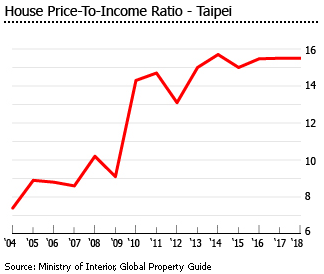
Housing demand was boosted after 2009 when the government cut inheritance tax rates from 50% to 10%, and interest rates were cut. Unmonitored speculation, low housing supply, and a long tradition of homeownership pushed house prices in Taiwan, particularly in the capital city, and particularly on high-end properties. A three-bedroom apartment, which cost just TWD6 million to TWD7 million in 1995, was sold for about TWD20 million last year.
From 2001 to 2018:
- In Taipei City, the house price index rose by 196% (147% inflation-adjusted)
- In Xinbei, the house price index rose by 205% (155% inflation-adjusted)
- In Taoyuan, the house price index rose by 181% (134% inflation-adjusted)
- In Hsinchu, the house price index rose by 137% (97% inflation-adjusted)
- In Taichung, the house price index rose by 234% (178% inflation-adjusted)
- In Kaohsiung, the house price index rose by 168% (123% inflation-adjusted)
“Unfortunately, buying a home remains unaffordable for most young Taiwanese, a situation we don’t expect to change in the medium term,” said Emily Dabbs of Moody’s Analytics. An average household in Taipei needs to pay two-thirds of income for a mortgage loan, far above the affordable limit of 30%.
Dramatic measures introduced to curb speculation
Worries about mainland speculators peaked in early 2008 when residential property prices rose by more than 10% y-o-y during the first quarter. Upward pressure increased again, when Chinese banks based in Taiwan were able to offer mortgages after the signing of an MOU in November 2009.
From October 2009 onwards, the central bank actively urged banks to closely monitor mortgage-lending risks. It asked banks to reduce loan-to-value ratios, raise interest rates, and remove grace periods related to loans for investment properties. The central bank also conducted targeted examinations related to real estate lending.
A big step was to assign a 100% risk weighting to non-owner occupied residential mortgages. Risk weightings for other home mortgage portfolios range from 50% to 80%, compared with 10%-20% for banks in developed markets in Asia-Pacific that practice the Internal Ratings-Based Approach to credit risk.
In 2011 a luxury was introduced. Second homes not occupied by the owner and sold within one year of purchase were taxed at 15%, and those sold within two years of purchase taxed at 10%.
From March 2014 much tougher measures were introduced which caused house prices in Taiwan to drop 7.9% (3.7% inflation-adjusted) from Q2 2014 to Q1 2016. Growth was a meagre 2.7% (0.9% inflation-adjusted) from Q2 2016 to Q4 2018.
These were the measures:
In March 2014, property taxes on non-owner-occupied residential properties were raised to between 1.5% and 3.6%, from the current range of 1.2% to 2%.
Inspections of pre-sale house transactions were tightened. State-owned bank lowered loan-to-value ratios for first-time buyers from 80% to 70%, and to 50% to 60% for people owning more than one property.
On January 1 2016 a new property gains tax of as much as 45% took effect. Property sellers are now required to pay between 15% and 45% of gains based on market prices, instead of the previously used government-assessed values. Qualified property sellers with gains of less than TWD4 million (US$128,800) are exempt from the tax.
Residential construction activity continues to rise
Residential construction activity is rising. In 2018, the number and area of residential construction licenses in Taiwan rose by 32.3% and 22.5%, respectively, according to the Ministry of Interior.
The upward momentum continued this year.
- The number of residential construction licenses surged 23.3% y-o-y to 58,936 in the first five months of 2019
- The total floor area of residential construction licenses increased 20% y-o-y to 8.85 million square meters (sq. m.) over the same period
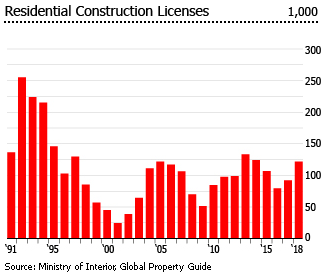
Taichung accounted for the biggest share of about 20.5% of all residential construction licenses issued in Jan-May 2019. It was followed by Taiwan Province with 19.6% share, New Taipei (16.8%), Taoyuan (13.3%), Tainan (10.9%), Kaohsiung (10.6%), Taipei City (7.8%) and Fuchien Province (0.4%).
New housing loans surge, amidst ultra-low interest rates
Housing loans have hardly increased 2009-2018, as a result of the central bank’s macro-prudential measures. Yet interest rates for housing loans in Taiwan are among the lowest in the region.
Most residential mortgages in Taiwan are variable rate, with an average maturity of 25 years. The average interest rate for housing loans stood at 1.622% in May 2019, almost unchanged from 1.627% a year earlier. The Central Bank of the Republic of China (Taiwan)’s benchmark interest rate currently stands at 1.375%, unchanged since June 2016 when it was cut by 12.5 basis points.
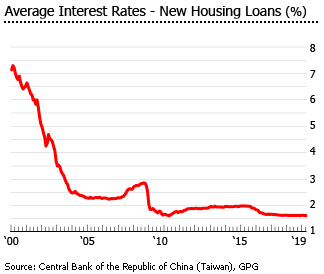
During the first five months of 2019, the amount of new housing loans surged by more than 15% from a year earlier, to TWD230.5 billion (US$7.42 billion), according to the central bank. Likewise, outstanding housing loans increased 5.2% y-o-y to TWD7.1 trillion (US$228.65 billion) in May 2019. Although total outstanding housing loans had previously grown by an average of 4.3% annually from 2009 to 2018, they remained absolutely steady as proportion of GDP from 2009 to 2018, at around 37% of GDP.
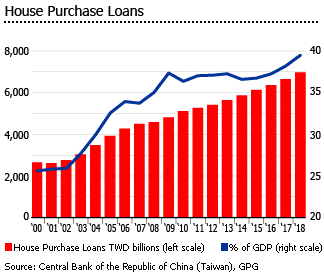
Taiwan’s vanishingly low rental yields
Taipei now vies with Monaco for the lowest yields in the world. Taipei is not a happy place to be a landlord. The owner of an apartment in Taipei will be lucky to realize 2% yields, except on the very smallest apartments. Currently, average rental yields in Taiwan hover around 1.5%.
Such low yields are often a sign of an overvalued market. Given that the Global Property Guide’s figures are for gross rental yields, i.e., do not make any allowance for vacant periods, for legal costs, administration costs, cleaning and repairs, rental taxes, property taxes, and other taxes, it is safe to say that landlords in Taiwan earn nothing on their apartments.
Paradoxically Taiwan has one of the highest home ownership rates in the world at 87%, while social housing accounts for about 5% of households. And the trend towards home ownership is increasing. Because of this, Taiwan’s rental market is quite small, around 8% of around seven million households.
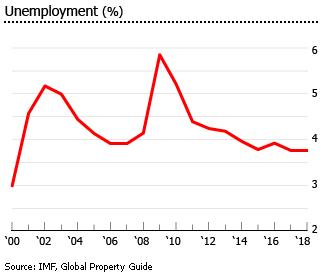
China-Taiwan relations reached new low after Tsai Ing-wen took power
In the January 2016 presidential elections, Tsai Ing-wen led the Democratic Progressive Party (DPP) to landslide victory and became Taiwan’s first female president.
One of Tsai’s key economic policies is to reduce Taiwan’s reliance on Mainland China, which accounts for around 40% of the island’s exports. Tsai plans to form closer ties with the ASEAN.
Mainland China is highly suspicious of Tsai, warning her against any attempt at a formal breakaway. Early in 2016, the Chinese government announced that it had cut off official contact with Taipei. In December 2016, Taiwan sent a blunt message to China by preparing its military forces and stepping up its training exercises to fend off Beijing’s threats.
Taiwan’s relations with China reached a new low after China decided to boycott the Olympic-style sporting event, 2017 Summer Universiade, which was held in Taipei in August 2017.
In August 2018, the Central American state of El Salvador severed ties with Taiwan and officially recognized Beijing, citing domestic economic concerns and international realities as motivating factors behind the move, not to mention the latter’s assurance of providing development assistance in the country. El Salvador was the fifth country to cut ties with Taiwan since Tsai came to office, following the Burkina Faso, Dominican Republic, Sao Tome and Principe, and Panama.
“China stealing our allies, pressuring our international space won’t shrink the distance across the strait and won’t allow for peaceful, friendly development of cross-strait relations,” said Taiwan’s foreign minister Joseph Wu.
Taiwan now has only 17 diplomatic allies left.
China’s campaign to isolate Taiwan extends to minute details. In the past months, Beijing has been sending warning to airlines to list “Taiwan, China”, rather than just “Taiwan”, on their websites. The move seems working after The Associated Press found that about 20 carriers, including Air Canada, British Airways, and Lufthansa, now refer to Taiwan as a part of China on their websites. In addition, China fined a Japanese clothing company recently for listing Taiwan as the “country of origin” on packaging.
In June 2018, the United States officially opened the American Institute in Taiwan (AIT), which serves as the US’ de facto embassy in Taipei, escalating further the tensions between Taiwan and Mainland China.
Relations between Mainland China and Taiwan thawed after President Ma of the Kuomintang Party (KMT) assumed office in May 2008. He vowed greater cooperation with Mainland China and denounced independence for Taiwan, a sharp contrast to his nationalist but corrupt predecessor, Chen Shui-bian. In November 2009, several memorandums of agreement between Taiwan and China on financial cooperation were signed. These gestures reassured investors and home buyers alike. In June 2010, an Economic Cooperation Framework Agreement (ECFA) was signed by Taiwan and China. President Ma also accepted the 1992 consensus, which played a crucial role in lowering tensions with China and boosting cross-strait economic ties.
Ma was reelected in the 2012 presidential elections. Cross-straits trade nearly doubled during Ma’s term, reaching US$198 billion in 2014. Tourism flourished, with nearly three million Chinese tourists a year.
In July 2019, the US announced of its intent to sell 108 M1A2T Abram tanks and Stinger missiles worth US$2.2 billion to Taiwan, despite China’s demand to cancel the said sale. The weapons deal to Taiwan is a vital aspect of a political deterrence strategy and a signal to China of US commitment to Taiwan and to a peaceful resolution of cross-strait differences. As an expression of outrage, China recently said that it would impose sanctions on US firms involved in the weapons sale, as it harmed China’s sovereignty and national security.
Economic growth slowing
Taiwan’s economy grew by 1.71% in Q1 2019 from a year earlier, down slightly from 1.8% growth in Q4 2018 and the lowest expansion since hitting 1.22% in Q2 2016, according to the Directorate General of Budget, Accounting and Statistics (DGBAS).
Recently, DGBAS slashed its forecast for Taiwan’s 2019 economic growth to 2.19% from an earlier projection of a 2.27% growth, amidst rising uncertainty over global demand.
Exports, which accounts for about 60% of the country’s GDP, are now expected to remain in the negative for the whole year, after the US raised tariffs on an additional US$20 billion of Chinese goods last May.
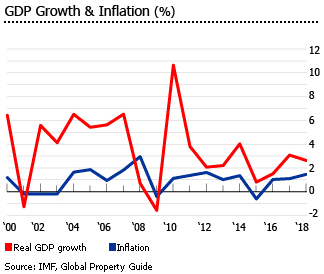
Taiwan, heavily dependent on exports, was seriously affected by the US economic recession in 2008. The economy bounced back in 2010 with spectacular growth of 10.6%, but since then growth has been modest. The Taiwanese economy grew by 2.6% last year, after annual growth rates of 3.1% in 2017, 1.5% in 2016, 0.8% in 2015, 4% in 2014, 2.2% in 2013, 2.1% in 2012, 3.8% in 2011, and 10.6% in 2010, according to the International Monetary Fund (IMF).
Nationwide inflation stood at 0.86% in June 2019, down from 1.4% a year earlier, according to the National Statistics. Inflation is expected at around 1.1% this year, at par from an average of 1.05% from 2010 to 2018.
Unemployment was 3.67% in May 2019, almost unchanged from a year earlier. Unemployment averaged 4.3% from 2000 to 2018.
Sources:
- The first quarter of 2019 (Xinyi house price index) (Sinyi Realty): https://www.sinyinews.com.tw/quarterly
- Housing transactions in 6 major cities up 15% month-on-month in May (Focus Taiwan News Channel): http://focustaiwan.tw/news/aeco/201906070014.aspx
- Monthly Bulletin of Interior Statistics (Ministry of Interior): https://www.moi.gov.tw/files/site_stuff/321/1/month/month_en.html#8%20Construction%20and%20Planning
- Financial Statistics Monthly (Central Bank of the Republic of China (Taiwan)): https://www.cbc.gov.tw/ct.asp?xItem=1059&ctNode=535&mp=2
- World Economic Outlook Database (International Monetary Fund): https://www.imf.org/external/pubs/ft/weo/2019/01/weodata/index.aspx
- Taiwan’s unhappy property owners (Global Property Guide): https://www.globalpropertyguide.com/Asia/Taiwan/Rental-Yields
- Taiwan interest rate (Trading Economics): https://tradingeconomics.com/taiwan/interest-rate
- DGBAS lowers GDP growth forecast (Taipei Times): http://www.taipeitimes.com/News/biz/archives/2019/05/25/2003715731
- Latest Indicators (National Statistics): https://eng.stat.gov.tw/point.asp?index=2
- US arms sales shows Taiwan’s security is non-tradeable to the US and key to its Indo-Pacific strategy (South China Morning Post): https://www.scmp.com/comment/opinion/article/3018242/us-arms-sales-shows-taiwans-security-non-tradeable-us-and-key-its
- China holds military drills after US approves arms sale to Taiwan (Al Jazeera): https://www.aljazeera.com/news/asia-pacific/2019/07/china-holds-military-drills-approves-arms-sale-taiwan-190714053228921.html